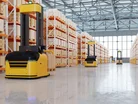Amazon Adds AI-Powered Forklifts to Its Fulfilment Centres

Amazon, a massive provider of AI services, is itself, taking some of its experience and applying it to part of the business that made it the giant it is today - its goods section.
As a result, Amazon has integrated autonomous forklifts into its warehousing and distribution operations to enhance efficiency and streamline logistics.
Amazon's integration of autonomous forklifts
The forklifts, equipped with advanced sensors and AI, navigate complex warehouse environments to perform tasks such as transporting materials, managing inventory as well as loading and unloading products.
This is all part of what is called Embodied AI, where AI can interact with physical things as opposed to just working in digital processes.
In Amazon's fulfilment centres, autonomous forklifts play a crucial role in optimising the flow of goods. They reduce the need for manual labour, minimise human error, and increase precision in material handling. The result leads to faster order processing and improved accuracy in order fulfilment.
The forklifts are part of a larger ecosystem of automated systems, including robotic arms and conveyor belts, which work together to ensure smooth operations.
Amazon uses autonomous forklifts to meet the demands of its rapid delivery services. By operating continuously without breaks, these forklifts contribute to higher productivity and ensure customer orders are processed swiftly and efficiently. The integration of these technologies reflects Amazon's commitment to innovation and efficiency in its supply chain operations.
Overall, autonomous forklifts are vital to Amazon's strategy to maintain its competitive edge in the e-commerce market. They drive efficiency and enhance the overall customer experience.
Emphasising the importance of continuous innovation and staying focused on current achievements Jeff Bezos, Executive Chairman of Amazon, believes innovation requires embracing new opportunities and creating solutions that drive progress. For instance, he is quoted as saying, "One of the only ways to get out of a tight box is to invent your way out" and "Every new thing creates two new questions and two new opportunities.
- Manufacturing and warehousing: Manufacturers like Germany, the United Kingdom, South Korea, and China have quickly adopted autonomous forklifts. The forklifts improve warehouse operations, increase storage density, and reduce labour costs, optimising production flows and saving financial capital. The warehousing and distribution sector, another major consumer, uses autonomous forklifts to automate loading and unloading processes, enhance inventory management, and improve overall supply chain efficiency.
- E-commerce and Automotive Industry Drivers: The booming e-commerce sector in countries like China, the United Kingdom, India, and Japan is a crucial driver of the autonomous forklift market. Additionally, the automotive industry in countries renowned for their automotive prowess, such as South Korea, Japan, and Germany, heavily relies on autonomous forklifts to streamline material handling operations in manufacturing plants and warehouses.
- Food and beverage: Autonomous forklifts are gaining traction in the food and beverage industry, where they handle and transport goods safely and efficiently.
Technological Advancements and Cobots
A significant advancement in the autonomous forklift industry is the integration of collaborative robots, or cobots, which allows these forklifts to work alongside human operators.
The collaboration enhances flexibility and productivity in dynamic warehouse environments. As engineering technology and AI evolve, this synergy is expected to boost industrial efficiency further and increase the adoption of autonomous forklifts.
Autonomous forklifts offer numerous benefits, including enhancing efficiency and safety by reducing human error and increasing precision in material handling. They operate continuously without breaks, leading to higher productivity and reduced labour costs. Equipped with advanced sensors and AI, these forklifts navigate complex warehouse environments, optimise routes, and manage inventory with minimal human intervention.
Integration with existing warehouse management systems and infrastructure can be complex and time-consuming.
Ensuring the cybersecurity of these autonomous systems is crucial to prevent potential breaches that could disrupt operations.
Additionally, changes in warehouse layouts may necessitate reprogramming and recalibration, adding to maintenance costs and downtime. The transition to autonomous forklifts may lead to workforce displacement, raising concerns about job losses and the need for retraining employees.
Despite these challenges, the long-term benefits of improved safety, efficiency, and productivity continue to drive the adoption of autonomous forklifts in modern warehouses.
As industries across the globe, especially in developed countries like Germany and Italy, continue to embrace automation trends, the autonomous forklift market is set for robust growth. The industry's current trajectory indicates significant expansion, supported by technological advancements and the increasing demand for efficiency in industrial operations.
******
Make sure you check out the latest edition of AI Magazine and also sign up to our global conference series - Tech & AI LIVE 2024
******
AI Magazine is a BizClik brand

